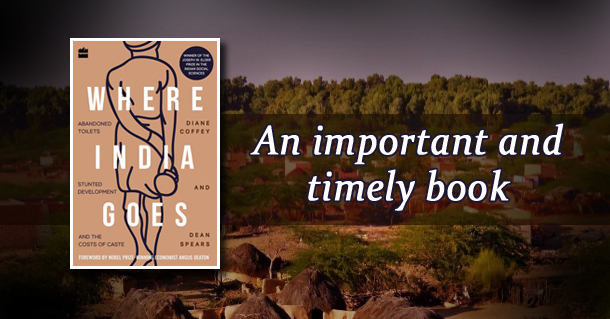
Book Review – Where India Goes: Abandoned Toilets, Stunted Development and the Costs of Caste
You can order the book from Flipkart here.
This is the title of written by Diane Coffey and Dean Spears. The forward is written by Noble Prize winner economist, Augus Deaton. The authors work in the Research Institute for Compassionate Economics (RICE). Rarely, a book like this appears in public that can open the eyes of not only concerned Indians, but also policy makers, social movements, and change agents. The finding of this research work is simple: so long as caste exists in India, India cannot become a healthy and wealthy country. Any attempt to make India healthy and wealthy without the abolition of the caste will be a failed and useless effort.
Coffey and Spears create empirical evidence for the hypothesis that has already been defended by the social reformers in India. What is so special about this research work is an interdisciplinary approach supported by intensive field work and data gathering and above all comparative analysis with the other countries. Let us look at the main findings of this timely book.
Why do the majority of Indians prefer to defecate in open?
The authors have shown that India is the only country which has not left defecating in the open compared to other countries. Why do Indians prefer to defecate in open? The reasons are not economic, not public policy related, and not at all related to lack of access to latrines. The most important reason is India’s caste system which creates the notion of “ritual” purity that makes people defecate in open leaving their homes. However, this open defecation makes India a nation of short-height dwarfs even compared to our neighbors in Bangladesh.
The authors hold an elaborate discussion on the failures of policies of three decades to stop Indians defecating in open. The Nirmal Bharat Abhiyan started by UPA in 2012 and later renamed as Swachch Bharat Mission by NDA Government cannot succeed though the Government has a deadline of ending open defecation by 2019. Given the findings of the book, it is impossible to achieve this target as it is unlikely that India’s upper caste will shed the notion of “religious” purity so easily even when that notion creates health hazards and deaths of the babies in India.
One of the interesting findings of the book is this: Muslims have more hygienic culture and their babies are healthier than Hindus.
The difference is due to the practice of open defecation among the Hindus. A lot more can be written about various findings in the book, but it better be left to every Indian, who must read the book for the sake of their country.

Where India Goes: Abandoned Toilets, Stunted Development and the Costs of Caste
The book has a potential to open new debates in India. The most important questions will be why the upper caste Indian researchers have not thrown light on India’s problem of caste that affects everything in India, including the health of the Indians. Is there is a caste-bias in academia? Yes, will be the answer. Where is taxpayers’ money going if not to facilitate research that has consequences for the national life? This book shows the standard research work that has to be standard for India’s researchers and academicians. The book exposes the hollowness or superficiality of the public policies and campaigns like “Swachch Bharat Mission” which cannot achieve any gains without “Casteless Bharat Mission”. Well, any public policy will fail if there is the caste system at the base of Indian society.
More than half the people who defecate in the open live in India. Around the world, people live longer, better lives than in centuries past, in part because of the rapid adoption of latrines and toilets that keep faecal germs away from growing children. India is an exception. Compared to the rest of the world, latrine and toilet adoption in India have been very slow and open defecation remains far too common. This is one reason why infants in India are more likely to die than in neighbouring poorer countries like Bangladesh and Nepal and are more likely to be stunted than children in sub-Saharan Africa.
“Where India Goes” demonstrates that open defecation in India is not the result of poverty but a direct consequence of the caste system, untouchability, and ritual purity. Coffey and Spears tell an unsanitized story of an unsanitary subject, with characters spanning the worlds of rural development policy: from mothers and babies living in villages to local government implementers, senior government policymakers and international development professionals. They write of increased funding and ever more unused latrines. This important and timely book calls again for the annihilation of caste and for a fundamental shift in policy perspectives to effect a crucial, much overdue change.
Order your copy from here.
Author – Mangesh Dahiwale, Human Rights Activist




+ There are no comments
Add yours